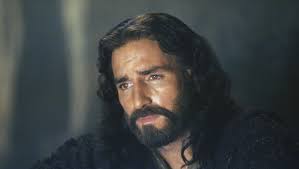"Who is Jesus Christ?" they asked. Could you answer them well?
- Christine DiGiacomo

- Apr 11, 2024
- 4 min read
I can see their beautiful young faces so clearly in my mind . . . one was dark, the other was light; one had a strong football build, the other a tall, lean volleyball build; one grew up in a Hindu household, the other a family that didn't talk much about God at all, didn't believe in church either. Both young men were there that cold, windy Easter day when I baptized their friend at a local beach. And when their campus club got started, both came to Fellowship of Christian Athletes because they didn't want to miss anything, especially when it came to filling in the blanks about Christianity and most importantly, Jesus. [Pressing pause for a moment - does it get any better than that? Two young athletes asking questions about the Man, the historical figure of Jesus, the Christ. I submit to you that it does not. Some may have heard me tell this story about Aakash and Lucas, but I will never get over or past it]
Each had heard God stories from classmates, and they were ready to entertain the question for themselves:
-Who is this Jesus Christ people are talking about? Truly, who is Jesus Christ?
-The blonde one said, 'No, no, no. Who was Jesus Christ?'
See, he wanted to hear about Jesus' life on earth because he did not grow up hearing the stories about the life of Jesus.
And so I sat down with pen and paper.
The question itself is a tricky one-'Who is Jesus?' But if you are unsure, perhaps you need to start with the question, 'Who was Jesus?' And why would Jesus come to earth with the express purpose of dying? To study the life of this sinless human being is to realize there is something far greater at work than just coming up with satisfactory answers; and that something is critically important.
So, who WAS Jesus? He was begotten, not made. He already existed, has always been, along with God the Father and the Holy Spirit. At the right time in history, Jesus willingly took on the flesh of a Jewish baby, born to a peasant maiden, a virgin, from a back country town in Israel, Nazareth.
'Born far from little Nazareth, away from Mary's home, without the help of her mother ... at a time when the census workers did not go door to door, but when all had to go to the city of their lineage to register. For Mary's betrothed, Joseph, that meant traveling to Bethlehem, because he was of the line of King David. At least a three-day trip from Nazareth, the Roman census requirement came at a time when Mary was close to delivering her holy child.
We do not know much about Jesus' childhood, though we know that Mary and Joseph knew the Messiah was growing up in their home, eating at their table. They raised Jesus like other Jewish children, steeped in the scriptures, the religious observances and feasts, equipped him in Joseph's trade.
Jesus began his ministry at the age of 30, recruiting 12 men to work alongside him. Jesus did life with them, mentored them, and in time, left his message for them to take to the world. The disciples watched as Jesus taught of his Father and of the kingdom, which would have no end. They watched as Jesus broke the social mores of his day, extending himself to a Samaritan, (reviled and hated by the Jewish people), extended himself to women, who were viewed as second-class citizens at best, to children, who he loved and embraced. He offended the pious Pharisaical Jews healing on the Sabbath; he broke the laws of nature by working miracles, casting out demons, and restoring sight to the blind. Neither the Jewish teachers nor the Roman leaders could figure him out, and they certainly could not contain him. [there is something about this Jesus, the uncontainable Jesus, that really appeals to me]. Jesus was at home with sinners and people of ill repute, dining with dishonest tax collectors and loose women. His love drew them to holiness as he modeled a better way, taught by example in word and in deed.
Jesus knew his strength lie in his connection with his Father, so he met alone to pray, to connect, and to seek direction. He said and did only what his father had him do; he did not execute his own will, but rather his Father's plan and purposes.
Ultimately, in total humility, he allowed himself to suffer and die,
without defending himself . . . for you, for me.
That is why Paul wanted the Philippians to emulate Christ's humility--take a look:
He wrote, "Have this mind among yourselves, which is yours in Christ Jesus, who, though he was in the form of God, did not count equality with God a thing to be grasped, but emptied himself, by taking the form of a servant, being born in the likeness of men. And being found in human form, he humbled himself by becoming obedient to the point of death, even death on a cross." Philippians 2.5-8
One day "at the name of Jesus every knee will bow, in heaven and on earth and under the earth, and every tongue confess that Jesus Christ is Lord, to the glory of God the Father." Philippians 2.10-11.
Jesus Christ - who he was, who he is, who he wants to be in our lives. He is without compare. Let me tell ya 'bout my Jesus: https://www.youtube.com/watch?v=FW5o2uBeMWQ
Christine
Philippians,11





Comments